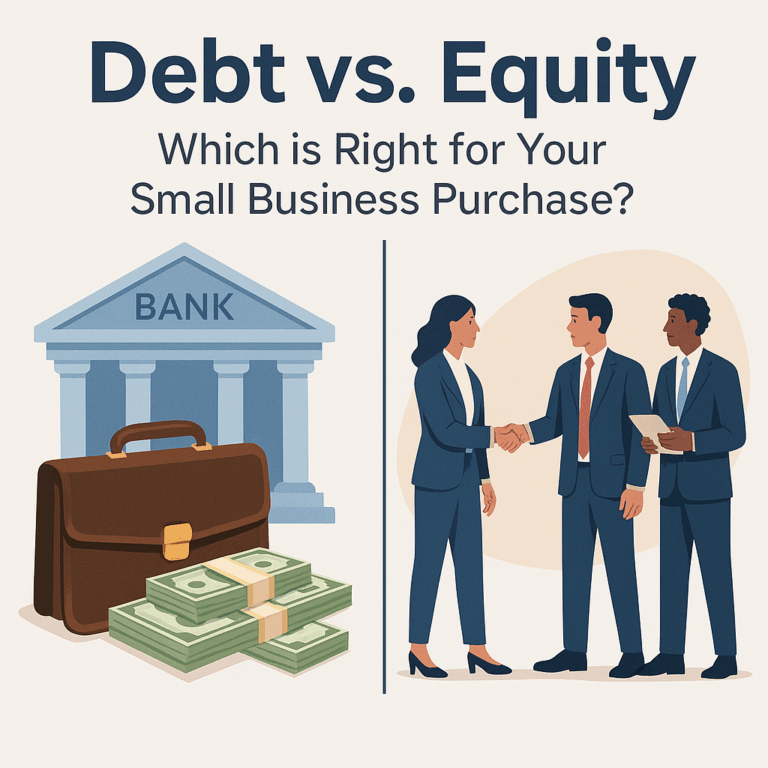
Debt vs. Equity: Choosing the Right Financing for Your Small Business Purchase
Chris Barrett
Introduction
When embarking on the journey to purchase a small business, one of the most critical decisions you’ll face is determining how to finance the acquisition. The two primary avenues are debt financing and equity financing. Each comes with its own set of advantages, risks, and implications for your future as a business owner.
In this article, we’ll delve into the nuances of both financing options, helping you make an informed choice that aligns with your financial goals and risk tolerance.
Understanding Debt Financing
What Is Debt Financing?
Debt financing involves borrowing money to fund your business purchase, typically through loans from banks, credit unions, or other financial institutions. You’ll be required to repay the borrowed amount over time, with interest.
Pros of Debt Financing
- Full Ownership Retention: By opting for debt, you maintain complete control over your business, as lenders do not acquire any ownership stake.
- Tax Benefits: Interest payments on business loans are often tax-deductible, potentially reducing your overall tax liability.
- Predictable Repayment Schedule: Fixed loan payments allow for easier budgeting and financial planning.
Cons of Debt Financing
- Repayment Obligation: Regardless of your business’s performance, you’re obligated to make regular loan payments, which can strain cash flow.
- Collateral Requirements: Lenders may require you to pledge assets as collateral, putting personal or business assets at risk in case of default.
- Creditworthiness Impact: Your ability to secure favorable loan terms depends on your credit history and financial standing.
Exploring Equity Financing
What Is Equity Financing?
Equity financing entails raising capital by selling shares of your business to investors. In return, these investors gain partial ownership and a claim on future profits.
Pros of Equity Financing
- No Repayment Pressure: Unlike loans, equity financing doesn’t require regular repayments, easing cash flow concerns.
- Shared Risk: Investors share in the business’s risks and rewards, potentially providing valuable support during challenging times.
- Access to Expertise: Equity partners often bring industry experience, networks, and strategic guidance to the table.
Cons of Equity Financing
- Diluted Ownership: Selling equity means giving up a portion of your ownership and control over business decisions.
- Profit Sharing: You’ll need to share a portion of your profits with investors, which could impact your personal earnings.
- Potential Conflicts: Differences in vision or strategy between you and your investors can lead to disagreements.
Debt vs. Equity Financing: A Comparative Overview
| Key Point | Debt Financing | Equity Financing |
|---|---|---|
| Ownership | Retain full ownership | Ownership is shared with investors |
| Repayment Obligation | Regular payments with interest | No repayment; investors share in profits |
| Risk Level | Higher personal financial risk | Risk is shared among owners |
| Control | Full control over business decisions | Decisions may require investor approval |
| Tax Implications | Interest payments may be tax-deductible | No tax deductions; dividends are not deductible |
| Access to Capital | Based on creditworthiness and collateral | Based on business potential and investor interest |
Factors to Consider When Choosing Between Debt and Equity
- Financial Stability: Assess your ability to meet regular loan payments without compromising business operations.
- Growth Objectives: Consider whether you prefer slower, self-funded growth or accelerated expansion with investor support.
- Control Preferences: Determine how much control you’re willing to share in exchange for capital.
- Risk Appetite: Evaluate your comfort level with financial risk and potential debt obligations.
- Investor Value: Weigh the strategic benefits investors might bring beyond just capital.
Conclusion
Choosing between debt vs equity financing is a pivotal decision in the process of acquiring a small business. Debt financing allows you to retain full ownership but comes with repayment obligations and financial risk. Equity financing, on the other hand, provides capital without the pressure of repayments but requires sharing ownership and profits.
Ultimately, the right choice depends on your individual circumstances, financial goals, and risk tolerance. Carefully evaluate both options, and consider consulting with financial advisors or mentors to make an informed decision that sets your business up for long-term success.
Watch the Video: Debt vs. Equity Financing for Small Business Acquisition
Prefer watching over reading? You can also watch my video on this topic, where I dive into the key differences between debt and equity financing for buying a small business. It’s a quick and insightful way to understand which option might be best for your situation. Click here to watch the video.
Frequently Asked Questions
Yes, many entrepreneurs use a combination of both to balance the benefits and mitigate the drawbacks of each financing method.
A higher credit score can improve your chances of obtaining favorable loan terms, including lower interest rates and better repayment schedules.
Equity financing can come from angel investors, venture capitalists, crowdfunding platforms, or even friends and family willing to invest in your business.
Yes, options like seller financing, grants, or convertible notes can also be considered, depending on your specific situation and the business you’re acquiring.

Disclaimer
The content contained in this blog post is intended for general informational purposes only and is not meant to constitute legal, tax, accounting, or investment advice. You should consult a qualified legal or tax professional regarding your specific situation.
